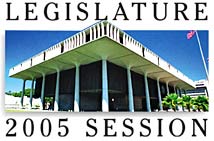Bill aims to block
HMSA’s 4.9% rate hike
The state insurance commissioner
says the measure is a bad move
and may face legal problems
Two state Senate committees jointly passed a bill yesterday that would freeze Hawaii Medical Service Association's rates, blocking a 4.9 percent rate increase the insurer is seeking for small businesses.
The amended bill was in response to legislation from the Lingle administration to reduce the maximum level of monetary reserves that can be held by a managed health care plan.
|
|
The administration's version of the bill required insurers to lower reserves by sending refunds to members.
But the state Insurance Division, which drafted the original SB 760, is opposed to combining the rate increase and reserve level issues.
Calling it "a very bad approach," state Insurance Commissioner J.P. Schmidt said it creates an uneven playing field and could face legal challenges.
The most glaring problem, he said, is that HMSA could use its reserve surplus to undercut its competitors' rates.
"If HMSA's rate is significantly lower than any of the other insurers, then people will naturally want to sign up with HMSA, which could lead them to have even more than the close to 70 percent of the market they have now," Schmidt said. "This could cause financial problems for the other insurers. It's very important that we have a level playing field with equal competition between all players in the market."
Schmidt also said there is case law that raises legal questions about an insurance commissioner suppressing a rate to work off a reserve.
The bill, which now goes to the Ways and Means Committee before heading to the full Senate, was passed by the Committee on Commerce, Consumer Protection and Housing, headed by Ron Menor (D, Mililani); and the Committee on Health, chaired by Rosalyn Baker (D, Honokohau-Makena).
If the amended bill gets through the Senate, it then would be passed to the House for a new set of hearings. A companion bill in the House appears to be dead.
HMSA, the state's largest insurer and the primary target of the bill, had a third-quarter reserve of $516.3 million, or 33 percent of its annual expenses. The amount was about $68 million above the 30 percent threshold.
AlohaCare, which along with HMSA and Kaiser Permanente Hawaii provides the state's QUEST Medicaid program to low-income residents, is the only other state insurer above the 30 percent reserve level, with a surplus over that amount by about $1 million.
Menor defended the bill and noted that between 2000 and 2005 Hawaii small businesses have taken on rate increases of 36 percent, an additional $3,000 a year per employee in the preferred provider family plan.
"That's a lot for small business to bear, especially when HMSA is sitting on $516 million in reserve," Menor said. "This is far in excess of what's needed and much more than the maximum considered necessary in other states. Frankly, I believe this rate freeze should have been undertaken by the insurance commissioner much sooner."
HMSA Senior Vice President Cliff Cisco said the insurer opposes both versions of the bill.
"We have been testifying that the bill is unnecessary and overreaching on the part of the government into the management of HMSA," Cisco said.
Cisco said present regulations already give the insurance commissioner the authority to adjust rates and that it's not necessary to pass a bill.
Schmidt said he wants to keep the rate and reserve issues separate, as advised by national experts who are hired by the Insurance Division as consultants. He said HMSA's 4.9 percent rate increase request "may well be justified" but that the Insurance Division hasn't had a chance to examine it.
Small-business advocate Bev Harbin praised the amended bill.
"There's still a long path to the governor's desk," said Harbin, president of the Employers' Chamber of Commerce and a member of the state Prepaid Health Care Council. "But this action is keeping open public dialogue with the Legislature by keeping this bill alive. These creative changes are real creative thinking on the part of the senators."
Harbin also said the rate freeze benefits small businesses by allowing the extra money to stay in the economy until the reserve gets spent down.
"Where HMSA is going to raise a red flag is if they are forced to spend their reserve down to the ... accepted amount per member for a three-month survival period," she said.
At the end of the third quarter, HMSA's reserves would allow it to operate for 3.9 months without any additional dues.
"If the health plan feels its reserves are too low and endangering the community, there's a process in which they could make a request to the insurance commission for relief from the freeze," she said.
Harbin said the Prepaid Health Care Council, which reviews and approves health care plans in Hawaii, is working on language now that could change the reserve levels in case of a terrorist attack or acts of war.
"Under those sets of circumstances, the government and everybody else would have to get involved," she said. "But that (scenario) is a veiled reason for hanging on to high surpluses."
[News] [Business] [Features] [Sports] [Editorial] [Do It Electric!]
[Classified Ads] [Search] [Subscribe] [Info] [Letter to Editor]
[Feedback]

